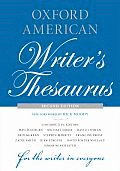 The Oxford American Writer’s Thesaurus (2nd Ed.) incorporates usage notes from an astonishing group of contributing authors, including Erin McKean, Stephin Merritt, Zadie Smith, Simon Winchester, Francine Prose, and David Foster Wallace. (Eternal disclosure.)
The Oxford American Writer’s Thesaurus (2nd Ed.) incorporates usage notes from an astonishing group of contributing authors, including Erin McKean, Stephin Merritt, Zadie Smith, Simon Winchester, Francine Prose, and David Foster Wallace. (Eternal disclosure.)
Looking for something else last night, I discovered this entertaining note, signed “DFW & EM,” on “effete”:
Here’s a word on which some dictionaries and useage authorities haven’t caught up with the realities of literate usage. Yes, the traditional meaning of effete is “depleted of vitality, washed out, exhausted” — and in a college paper for an older prof you’d probably want to use it only that way. But a great many educated people accept effete now also as a pejorative synonym for elite or elitist, one with an added suggestion of effeminancy, over-refinement, pretension, and/or decadence; and in these writers’ opinion it is not a boner to use effete this way, since no other word has quite its connotative flavor. Traditionalists who see this evolved definition as an error often blame Spiro Agnew’s characterization of some liberal group or other as “effete corps of independent snobs,” but there are deeper reasons for this evolution, such as that effete derives from the Latin effetus, which meant “worn out from bearing children” and thus had an obvious feminine connotation. Or that, historically, effete was often used to describe artistic movements that had exhausted their vitality, and one of the main characteristics of a kind of art’s exhaustion was its descent into excessive refinement/foppery/decadence.
Last month the OUP blog looked at a few other DFW notes.